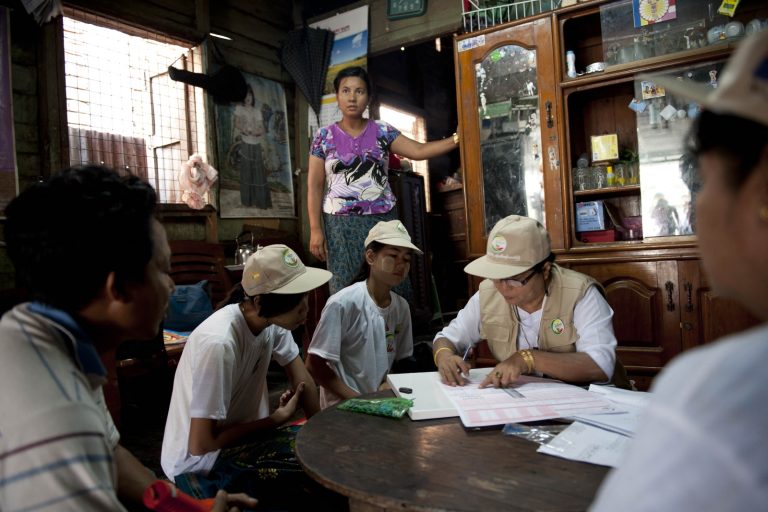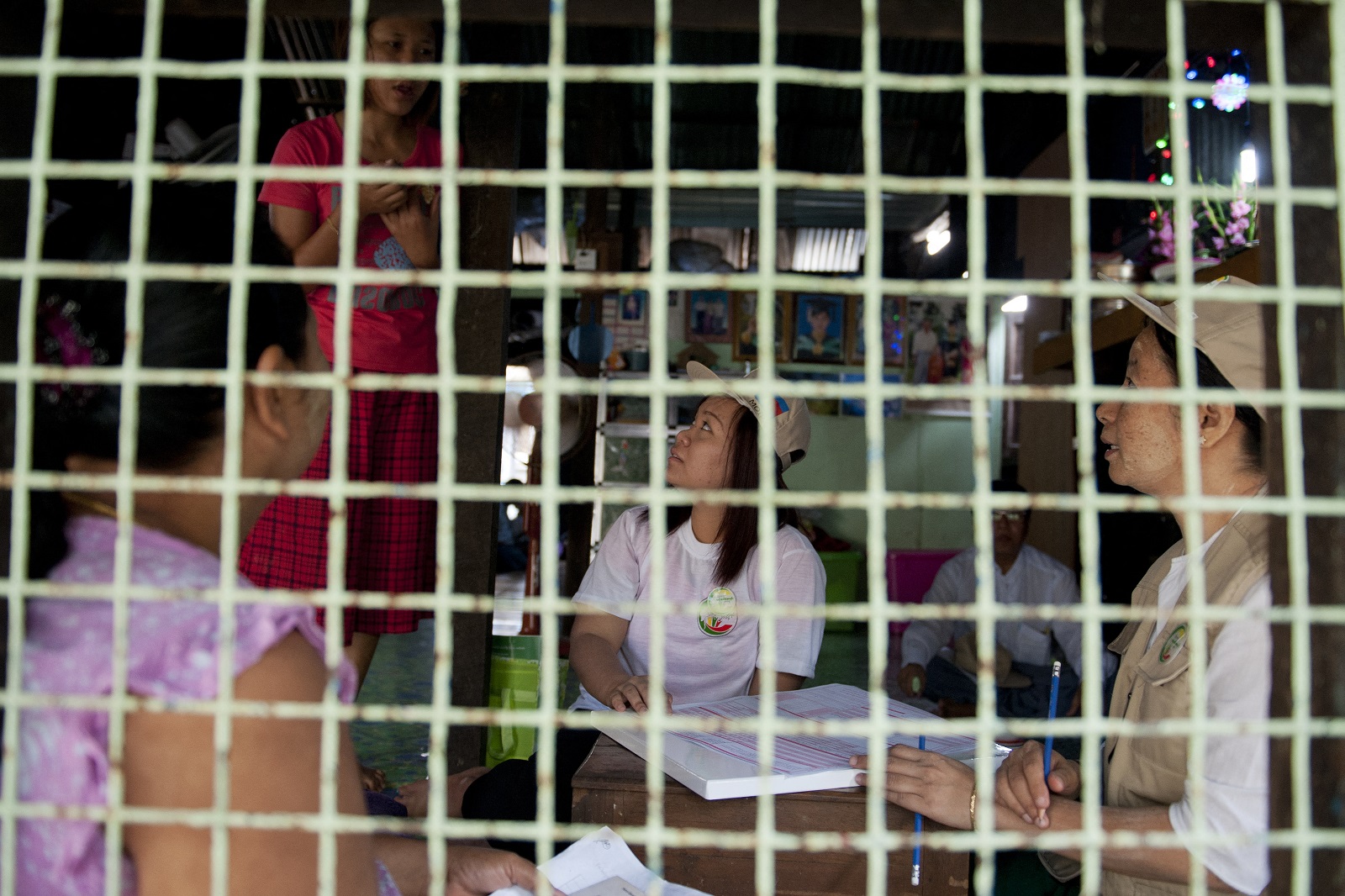The National Democratic Force holds only eight seats in the Union Parliament. But don’t tell chairman U Khin Maung Swe that his is a small party. He will be offended.

A candidate for Myanmar’s National Democratic Force (NDF) points at a party sample ballot at the party office in Yangon. (AFP)
“Politically speaking, we are not small. We are only small on the financial and manpower side,” he said, adding that the NDF expects to grow tenfold in the November 8 election, winning 50 seats in the Union Parliament plus 50 more on the state and regional level.
In 2010 the party leader was convinced that a similar result was within grasping distance, but extensive vote rigging, well documented by election watchdogs like ANFREL, robbed the party of all but 16 seats. Half of the NDF MPs elected in 2010 have since left the party.
U Khin Maung Swe isn’t the only optimist. The National Unity Party, the successor of the Burma Socialist Programme Party, the only political entity allowed to exist in Myanmar from 1964 until its demise after the nationwide unrest in 1988, plans to field 756 candidates this year; 204 for the Pyithu Hluttaw (Lower House), 99 for the Amyotha Hluttaw (Upper House), and 438 for the State and Region parliaments. Currently the party holds 64 seats on the national and regional level.
In an election overshadowed by two titans, the National League for Democracy and the ruling Union Solidarity and Development Party, Myanmar’s political underdogs will fight for their place in the sun—or die trying.
Support more independent journalism like this. Sign up to be a Frontier member.
Even if the influence of the NDF and NUP isn’t broad, their roots go deep.
In 2010, the NDF became a political life raft for NLD members who didn’t support the decision not to reregister as a political party and to boycott the election. NLD-leader Daw Aung San Suu Kyi condemned the breakaway group for undermining her party – relations have been strained ever since.
In the run-up to the November 2010 election several incidents were reported of the main opposition party trying to thwart the NDF-campaign. NLD-members followed the NDF campaign caravan around in a petty effort to keep the democrats from gaining support, even though they share much of the same philosophy.
Grudges remain until today. “Daw Aung San Suu Kyi felt we committed a political crime when we stepped forward in 2010,” said U Khin Maung Swe. “But now she took the same train. So what is the difference exactly?”
The NUP was formed by members of the defunct BSPP and the military junta to challenge the NLD in the 1990 elections, but it suffered a crushing defeat. The loyalists of former dictator Ne Win have always seen the post-1988 generation of soldiers as deeply corrupt. They also despise the regime that ruled until 2011 for putting Ne Win under house arrest. The ‘old man’ died in his Inya Lake residence in December 2002.
Although both the former and the current ruling elite parties have a strong army flavour, the NUP filed more complaints against the USDP than any other party during the 2010 election.
“Yes, we were cheated in the 2010 election,” said NUP central executive committee member U Tun Yee. “But if we can’t forget the past, we can’t move on.”
U Tun Yee himself will run in Thayet constituency, in Magway Region, for a seat in the Pyithu Hluttaw. He is confident that this election will be the fairest yet, thanks to better legal infrastructure and international monitoring.
The NUP is also well aware of its local bases. “We enjoy a lot of support in the Bamar regions, for instance in Sagaing. Our aim is to win more than the 64 seats we have now, and be part of Region Governments. Only then can we really work for the Myanmar people,” he said. “No, we don’t fear that we will be swept away. We have 27 years of experience in politics. [The other parties] don’t have that.”
Prominent political analyst U Yan Myo Thein doesn’t buy the narrative of a glorious comeback for the underdogs. He said the smoke and mirrors of 2010 may indeed have robbed these parties of seats, but today it gives them a convenient excuse to ignore the reality that both parties will almost certainly shrink after November.
“The only popular party is the National League for Democracy,” said U Yan Myo Thein.
He argued that in 2010, most of the NDF’s support base viewed it as a stand in and simply went back to the NLD when it re-entered the political playing field to contest the April 2012 by-elections. Half of the NDF’s MPs jumped ship to return to the bosom of the mother party. Even the NUP, the NLD’s ancestral enemy, took in jilted NLD supporters who didn’t trust the new NDF but were desperate for any alternative to the USDP.
In other words, these parties were scavengers, growing not from an abundance of voter demand but a shortage of options. As for their present optimism: “Politicians have to sound like that,” Yan Myo Thein said with a laugh.
Yet the NUP is at least putting its money where its mouth is. Two hundred and fifty million kyat in registration deposits, to be exact.
A candidate’s registration deposit is refunded if they win at least 12.5% of the vote. The NUP, which funds itself through a combination of donations and a K1000 yearly membership fee, is registering all of its candidates from its own coffers.
“We do not need to worry about money because there is so much opportunity to get it back,” said U Tun Yee. “We strongly believe we will win. And even if we lose, we can’t lose badly.”
There is another reason why the NUP does not have to worry about finance. The party was initially funded from the state budget. The headquarters of the party sit on 5,6 acres of land on University Avenue, one of the most expensive streets in Yangon. “The 50 year lease was given to us near the end of the BSPP era,” said central executive committee member U Nay Win, an elderly man dressed in crisp Burmese dress.
Yet the once-pristine compound is the worse for wear. Several buildings are in disrepair and unused. In the main building, where the CEC convenes, the meeting room sports tired furniture in Eastern Bloc colours.
In comparison the NDF has to make do with a modest, two-floor office decorated with party posters, country maps marked in red pen and a large, golden kamauk (bamboo hat), the NDF symbol.
But for NDF-Chairman U Khin Maung Swe, the contest is much more than a numbers game. He said there is a fundamental difference in approach between the NDF and its rivals.
“The NLD is using the image of Daw Aung San Suu Kyi. They are not making a real organization. And the USDP is buying the vote with money. They are not making a real organization. We are taking part in real politics.”
The return of the NLD isn’t the only way things have changed, said U Yan Myo Thein. Ethnic parties have also been gaining ground. Today, seven ethnic parties hold a combined total of 66 national seats, the largest being the Shan Nationalities Democratic Party with 21—more than both the NUP and NDF.
Parties like the Rakhine National Party and the SNLD are strong on their own turf. The RNP, which holds 18 out of 47 seats in the Rakhine State parliament, aims to win a majority in its home state and secure the Chief Minister post.
Ethnic parties are playing a slightly different game, Yan Myo Thein said. They tend to be less interested in nationwide control, and even if they lose ground in the Union Parliament, they can fall back on deep, powerful influence among their respective populations. National parties don’t have that kind of safety net.
Thus, between the steadily expanding ethnic bloc, the established USDP and the looming spectre of the NLD, the ground could be crumbling beneath the underdogs’ feet.
U Yan Myo Thein feels one way to stay politically relevant is to build strategic alliances with larger forces. He said the NUP has had made these kinds of deals with the USDP in exchange for financial support, yet the NDF still carries the strong individualistic tendencies it inherited from the NLD. They are limiting their resources to five states and 250 candidates. Where the election budget comes from, chairman U Khin Maung Swe was unable or unwilling to say.
Both parties still believe they will seize significant ground in November. They look to those who supported them in 2010, and whose voice they believe was snatched away.
The NDF election pamphlet says, “Cast a vote for the kamauk if you want to change the era.”
Soon they’ll find out if the struggle is one for change, or simply survival.






